Google recently settled with the National Labor Relations Board (NLRB) Over Political Bias Claims. In a recent segment on RT America, we discussed the Google antitrust probe and the political bias complaints from former Google employees.
Is there an unbiased search engine?
In this article, I discuss the following:
- Is there political bias in how Google displays search results?
- Does political bias impact ranking recommendations in search queries on Google?
- Are search engine results altered or manipulated during political elections?
- Does Google provide access to information regardless of a political viewpoint?
- Does Google rerank or change search engine results?
- Does Google Censor search engine results?
- Is Google’s search engine biased?
- Does big tech discriminate against right-leaning media outlets and employees?
- Does Google promote or demote content that is considered controversial or labeled as a conspiracy theory?
Does Google Censor Free Speech?
One of the most pressing issues in the 2020 election is our ability to access fair and balanced news on search engines. Americans want to make sure they are seeing content from all political parties in order to make an informed voting decision.
Recently, there has been concern over the suppression of content on search engines and the ability of big-tech to tamper with elections and SERP’s (search engine results pages). This is no secret and has been widely reported in the news. Some websites claimed that they have been blacklisted for certain search terms, and their content has been deranked because it is labeled as low-quality content.
Several conservative bloggers reported being manually banned for content in search results. Recently, President Trump tweeted that Google manipulated votes in the 2016 election. Some bloggers have reported that heavily trafficked articles saw a huge drop in search engine rankings. So what is really behind this?
The Politics Behind Machine Learning
The politics of artificial intelligence is a critical topic as we move towards better understanding algorithm rankings. In order to determine if algorithms are fair and balanced, you need to look at who is responsible for creating the algorithms in the first place.
Remember, the people who create the algorithms can create them to their own belief system.
This is why it is important that if a search engine owns 90 percent of the search market, that it employs people from all political point of views.
It is critical that machines are programmed properly for both Democrats and Republicans. The only way to do this is to have representation from both political parties.
Search Engine Manipulation
Does Google have an agenda?
Manipulating search engine results has also been a widespread issue covered in recent Congressional hearings.
So the million-dollar question is: Is this really due to political bias of search engines?
Or does it have to do with larger quality issues called “E-A-T” as outlined by Googles Quality Rater’s Guidelines?
Google’s Quality Rater Guidelines
E-A-T stands for Expertise, Authoritativeness, Trustworthiness.
What are Google Quality Rater Guidelines?
Google’s Quality Rater Guidelines (QRG) are used as a reference point to rate websites for overall authority and trustworthiness. Most recently, the QRG were updated in July of 2022 with major changes. Most notably, the biggest factor that is being used for ratings is the extent to which the content can cause harm to individuals or society at large. YMYL, which stands for “Your Money Your Life” is now defined as the potential to cause harm.
The definition of YMYL has changed since the initial publication of this article. YMYL topics are now:
- Inherently dangerous (extremism)
- Harmful (misinformation) + bad advice
The overall theme is that the information can cause harm to the user/reader and the content has grave potential to cause harm or impact the readers well being or financial standing. This change will certainly impact any cryptocurrency-related content, which falls under YMYL content.
Key Takeaways:
- Does the purpose of the page match the content on the page?
- Does the author exhibit expertise, trust, and authority to be the creator of the content?
- Does the author lack sufficient expertise to be the author of the content for the purpose of the page? (low quality)
- To what extent can the page cause harm to users?
Since the initial publication of this article, AI-Content generation tools have emerged, which will also substantially impact page rankings.
In Google’s recent quality rater guidelines update, Google placed a greater emphasis on news sites and algorithm changes in the news industry. There is also a stronger emphasis placed on author credibility, particularly in the (Your Money Or Your Life) YMLY Categories – Civics, Government and Law have been added to this area.
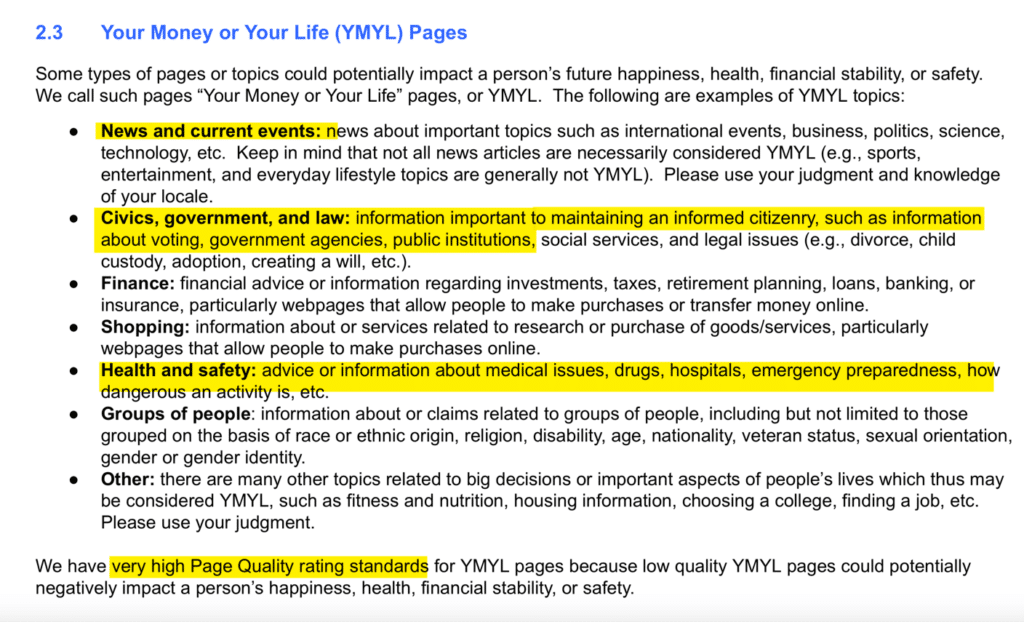
Additionally, alternative health sites have taken a hit in search ranking results. Reputation is also being considered in the quality rater guidelines from outside news sources.
Any website that is considered to be a YMYL page is put on a higher standard by Google because they have the ability to affect a searcher’s health, happiness, wealth, and safety.
E-A-T Worthy Content
There are over 200 technical SEO factors that can impact search engine rankings on Google.
But what about E-A-T and the impact it can have on search rankings?
When Google is rating your website, they are evaluating it for E-A-T-worthy content. The main question they are looking to answer when rating your site is: is this content trustworthy?
And it doesn’t matter if you tell people you are trustworthy. What really matters here is that others around the web from third-party sources are saying you are trustworthy.
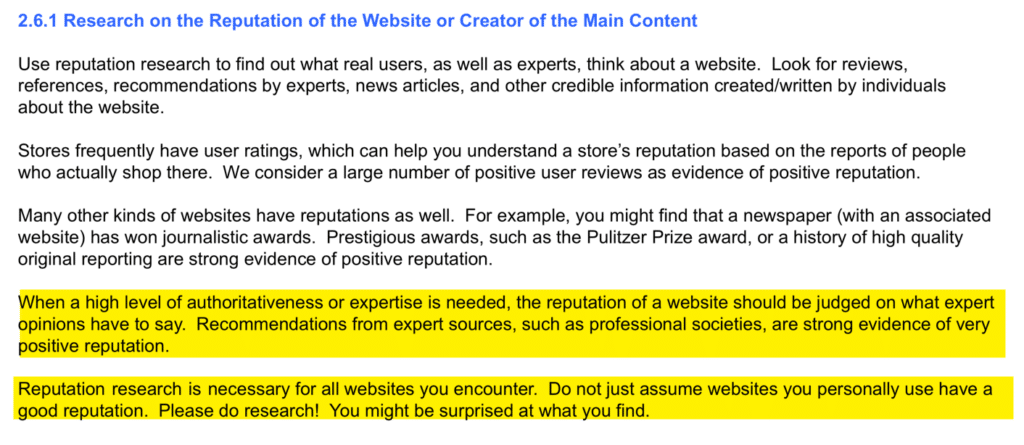
So now imagine that you have a popular right-wing website. The author states they are trustworthy. Then, you go to Google, and there are numerous complaints about the website and others saying this person is not credible at all and is spreading conspiracy theories. It almost doesn’t matter what the person says at this point. Because third-party credibility to support your own claim of expertise matters more than your actual credibility in Google’s eyes.

So even if you are authoritative in your field, if Google determines the author of the content has a poor online reputation, that will impact the search rankings of the website. If the author of the article has a poor digital reputation in the court of public opinion, that site is most likely going to tank and will never rank well.
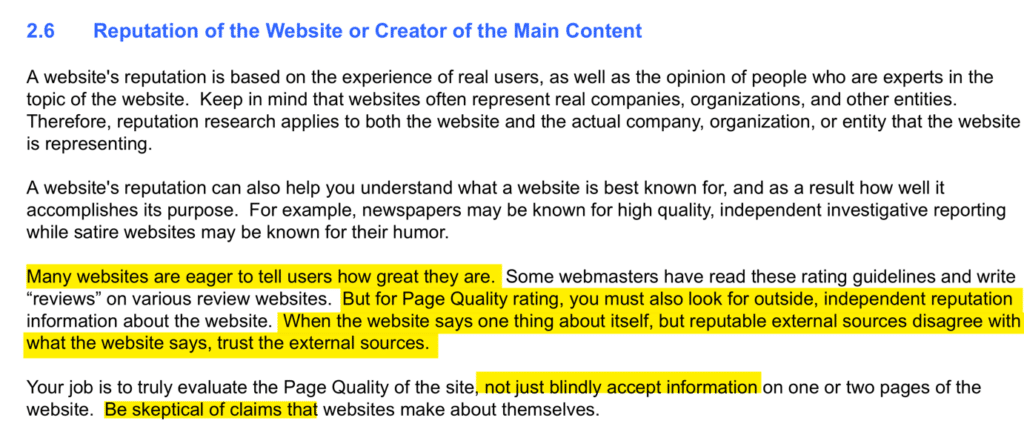
Google also emphasizes that your site must have a clear purpose.
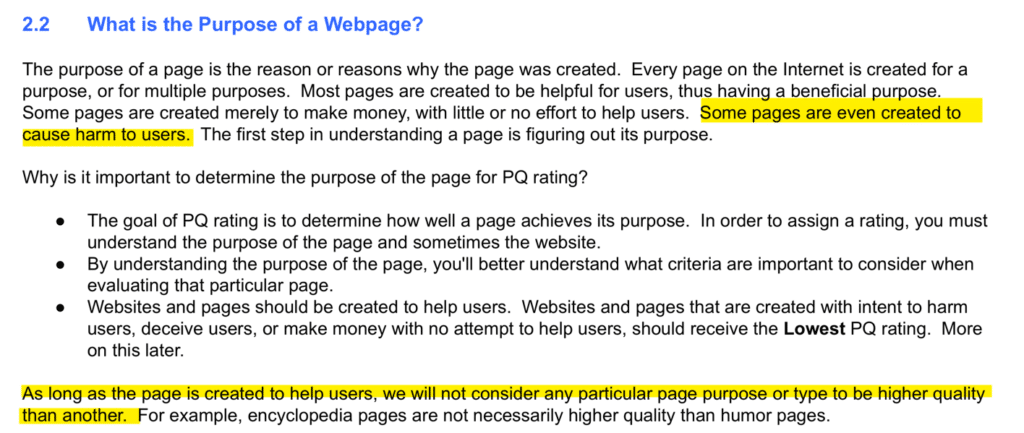
But what if the purpose of your site is by nature controversial?
For example, what if you create a website that states:
“The purpose of my site is to share the truth about vaccines.”
OR
“The purpose of this site is to share why abortion is wrong.”
See the inherent problem here? Google is viewing political pages or right-wing pages as having invalid page purposes to begin with. They believe the purpose of those pages is to harm users!
Additionally, the second highlighted statement there is a contradiction within their guidelines document. “As long as the page is created to help users, we will not consider any particular page purpose or type to be higher quality than another.” Incorrect.
Later on in the guidelines document, they go on to say the following:
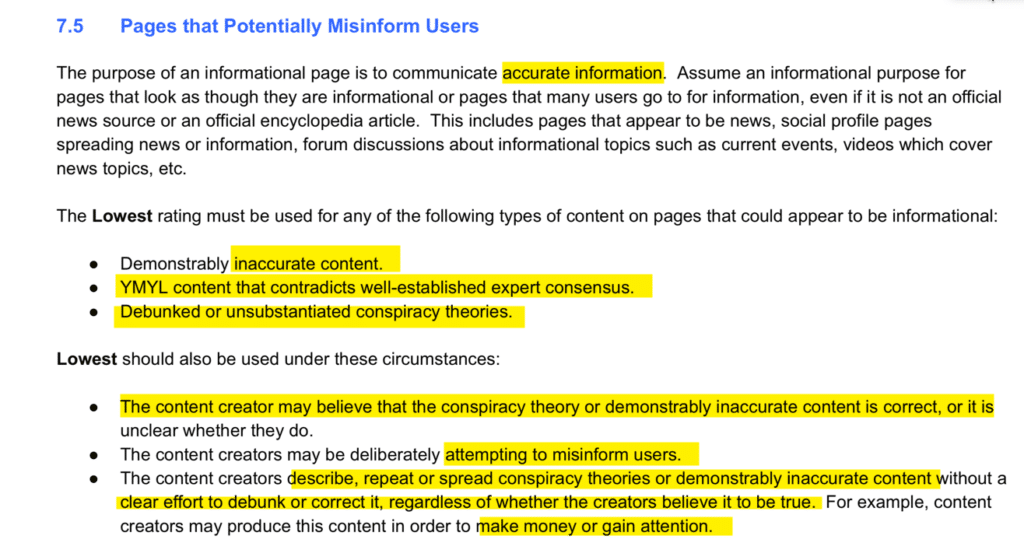
So here is the problem. Any information that is not considered acceptable by the mainstream will not be called “accurate content” if you are unable to provide citations to studies around the web supporting the claim. The majority of alternative health information or right-wing content will by nature contradict well-established expert consensus. All of this information may be labeled as “unsubstantiated conspiracy theories” by Google. Google will also say that this information is attempting to misinform rankings and spread conspiracy theories. If you are sharing information that cannot be cited by outside sources, it will be considered an opinion and may be more likely to get pushed down vs. a pharmaceutical company that can cite studies.
And the worst part of all of this? If you try to publish journalism that is not in the mainstream, Google is actually accusing users of doing it to “make money or gain attention.” How sad.
We have a global search problem that has to be course corrected.

LOW-QUALITY GOOGLE PAGES BY E-A-T STANDARDS
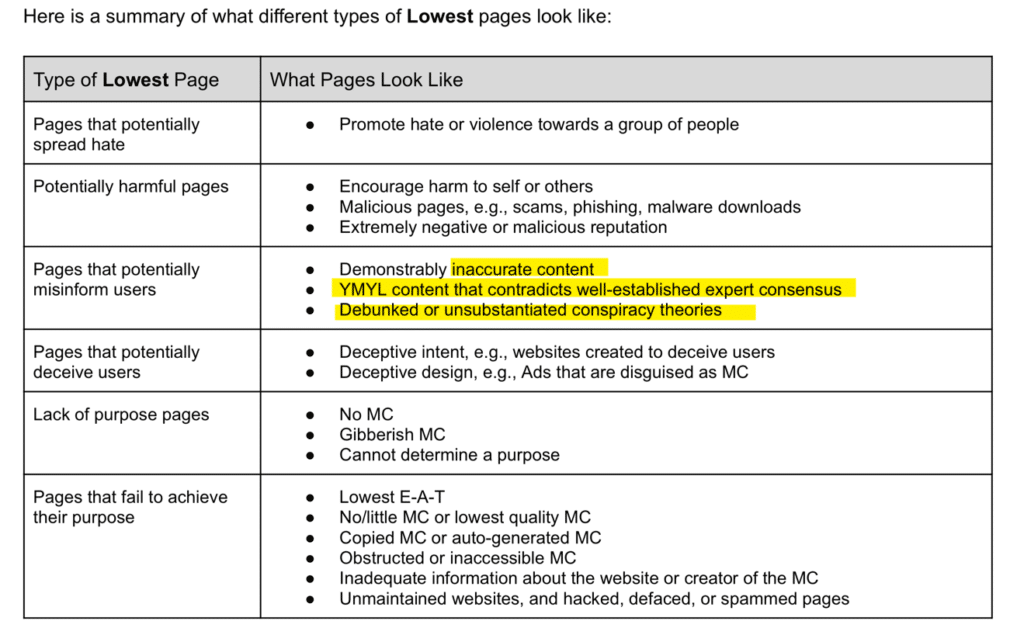
E-A-T Trust and Political Content
Even though you have followed Google’s guidelines of having the purpose of your site be visible, you are not following the guidelines because, in their eyes, you are spreading conspiracy theories. It doesn’t matter what you write, or how many blog posts you write because everyone says that “content is king!” Google will determine you are spreading fake news because these are not mainstream popular opinions, and you will see a steep decline in rankings that you most likely can’t ever recover from.
Google is not seeing this as political bias. They are very transparently saying: we will deprioritize site rankings that share views that are not popular.

E-A-T is all about trust. And if you are sharing any political opinions that are outside of the norm, Google will see that as a real danger and threat to consumers. You will tank in E-A-T rankings. I’m convinced this is the real issue because the alleged political bias that is being reported about Google, but no one has put the pieces together.
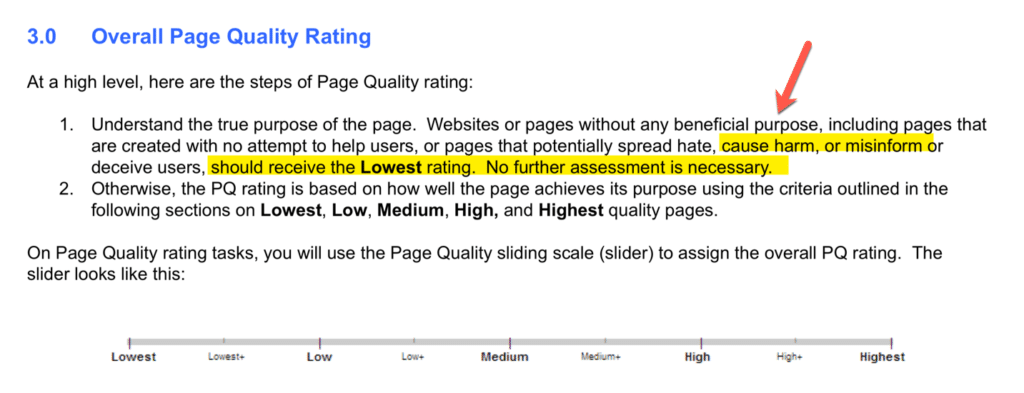
Additionally, the reputation of the content creators matters in the eyes of Google. So if the bios of the authors are controversial in any way, that will also negatively impact search rankings.
So, let’s explore this.
Let’s say Google has no political bias at all. But, if everyone else says your site is spreading conspiracy theories or leaves bad reviews about you all over the Internet, that will impact your rankings. And from what we have seen, many conservatives with strong opinions that are outside of the mainstream may fall under this category. If you pair that with Google’s brand-new quality rater guidelines, you have the perfect storm. I am not quite sure anyone has really connected the dots yet on this one, but I believe this is at the heart of what is really going on here.

This screenshot is taken from Google’s clause on Pages that potentially spread hate. What is most interesting here is that they ask the Quality Rater’s to use their own judgment based on personal knowledge.
Google cannot claim to be neutral and have no political bias when in the same sentence in a document created for quality review standards they tell reviewers to exercise personal judgment! Yes, I understand this particular clause is referring to pages that spread hate and not political pages, but you get the point.
An AP article stated, “Political leanings don’t factor into Google’s search algorithm. But the authoritativeness of page links that the algorithm spits out and the perception of thousands of human raters do.” I completely agree with this statement.
The other challenge, particularly for doctors in alternative medicine, is that Google is determining what is fact from a conspiracy. So, for example, if you dish out advice on your site that Google considers inaccurate or dangerous, your site will suffer in search results. If your views are alternative and differ from the mainstream, that is considered “dangerous.”

I believe this same principle is being applied to machine learning and quality rater reviews pertaining to politics.
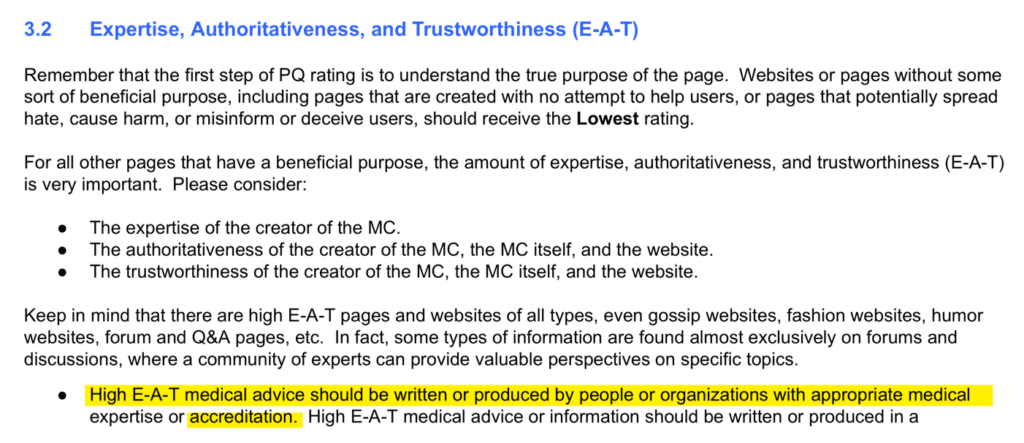
See what’s happening here? Google is essentially saying medical advice should NOT be given by people who do not have appropriate medical expertise or accreditation. But, what are they defining as “appropriate medical expertise” and accreditation? See how this could take out the entire field of alternative medicine sites in one clean swoop?

Can you see why this could be largely problematic? “Where such consensus exists.”
Well, there are many areas where consensus will NOT exist on topics ranging from healthcare to politics. So what happens to those sites where the opinions fall out of the mainstream, popular choice? Are they not considered quality pages? According to Google, yes, they are not, and they are deemed low-quality websites.
Why Author Reputation Can Tank Search Engine Rankings
Positive reputation is mentioned several times throughout this document. Many right-wing sites have been tarnished with negative reviews on accredited business review sites. So, Google will take that into consideration, and they are very clearly saying “positive reputation” matters for rankings.

So, if a political commentator or alternative healthcare practitioner has negative reputation mentions all over the Internet, Google will automatically derank that content from appearing in search results. They aren’t hiding that fact- it’s just that no one has really bothered to read through these quality guidelines and connected the dots together regarding the impact of these guidelines on political content search results.
I also notice several times throughout the quality rater guidelines one of the common criteria for low-quality page rankings is “the level of expertise of the author is not clearly communicated.
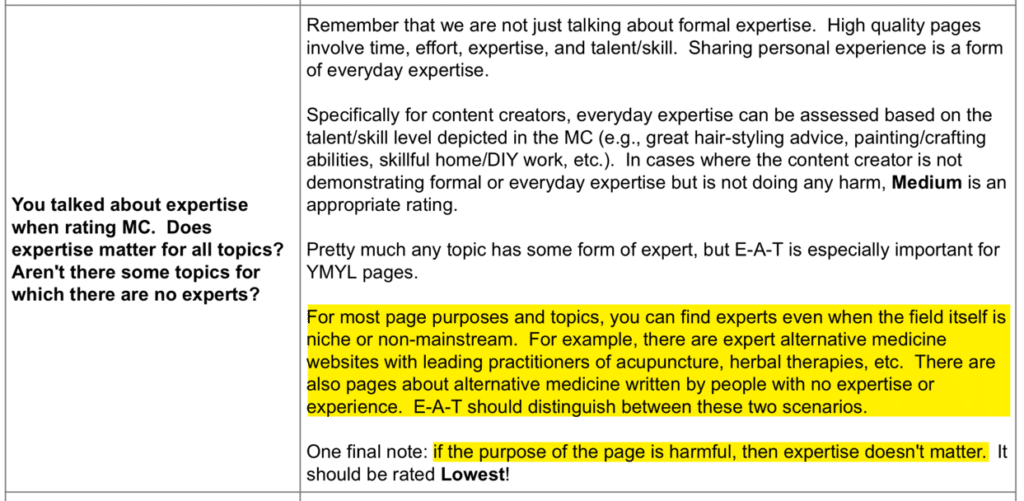
Yes, E-A-T SHOULD distinguish between the two scenarios, except when it doesn’t.
And that’s where the problem really begins…
Many right-wing commentators and political pundits who have risen to fame on Twitter and social media may not have the political background Google considers as “accredited” regarding expertise on politics.
Right off the bat, regardless of what they publish, Google will see an inconsistency with the topic of content they are writing about and their perceived background of expertise in the topic. Again, this will automatically tank search rankings, and Google is very clearly stating it.

Is Google politically biased?
So, does Google have a political bias when it comes to search engine results? I am going to leave that to you to determine because I don’t want this site to be flagged for “spreading conspiracy theories.”

Does Google censor search results?
What I really think is going on is that Google’s determination of “dangerous” information is the real culprit here. Any information being disseminated on the Internet around nontraditional healthcare remedies or non-mainstream political views is considered ‘dangerous’ because it does not reflect the popular opinion of the majority of Americans.
Google will de-prioritize this content in an effort to “protect” consumers from fake news. The problem is that for some people, that news is not fake news, and it is real news. They want access to both. And they do not want Google determining what is real vs. fake and what is dangerous vs. what is helpful.
In a private conversation with an anonymous SEO specialist, he said, “If you’re writing articles around science, show your research and medical journal citations so Google can verify it as credible. And if you’re writing about politics, don’t have negative social proof. How else would Google verify it as fact or fiction other than social proof? What algorithm could they create? There’s no way to measure politics because it is all opinion-based. You either have good social proof or you don’t.”
My reply?
“No. You don’t get it. Anyone in politics who is a conservative will automatically have negative social proof. That’s the whole point of this investigative journalism piece.”
That is my take on the issue. What is yours?
Is there any other search engine better than Google?
Mass surveillance, privacy, and data protection concerns rise in the U.S.
If you conclude that Google is in fact politically biased in how search results are displayed, you may be looking for an alternative search engine platform. Google still owns the majority of the search ecosystem, although TikTok is rapidly eating market share. Because Google is still the number one search engine, it would be problematic to ignore the platform for your SEO campaign. That being said, you should consider using several search platforms and review the differences in search results. Also, review the privacy policy of each search platform.
To answer the question, one has to define what ‘better’ means. If better means an alternative search engine platform that includes encryption, anonymity, less tracking, and government surveillance, there are certainly alternative options. That being said, government search warrants approved by Google have occasionally helped law enforcement track down criminal suspects. Everything is a tradeoff. Some people find this abhorrent, while others are willing to trade their privacy for overall societal ‘protection.’ The best search engine for you is the one that aligns with your views on privacy, data, freedom, government oversight, and intervention.
Search is highly political.
Anyone who says otherwise is either asleep at the wheel or does not truly understand how search works. SEO as in industry is one of the most political industries that exist. I rarely interact with many conservatives in the SEO industry. The loudest voices are liberal and typically try to remove conservatives from participating in the industry. This only further perpetuates the problem that Google is inherently biased with search engine results, and the people who control the search industry are also politically biased and largely lean-left. Where does that leave Conservatives? Off of page one.
If you hire a search marketing firm, it is important to work with someone who is rooting for you to succeed in search. Someone who disagrees with your beliefs may subconsciously sabotage the visibility of your search results.
As publicists and search engine marketers, our job is to help people find and discover you. That being said, the person you hire should want to help you achieve that mission. Someone who doesn’t want you found may want you buried in SEPRS. A search engine marketer can either raise your visibility or destroy it by burying it in SERPs. Choose wisely.
Alternative Search Engines:
What is the best alternative search engine to Google?
Although Google is still the dominant search engine, alternative platforms are looking to eat into the market share, leading to the rise of privacy-first search engines. Some of these search engines promise no search history, encryption, no cookies, no tracking.
Other promises of privacy-friendly search engine alternatives include:
- Anonymized queries stripped of personally identifying information
- No IP tracking
- Compliance with GDPR
- VPN integration
- No user profiling or targeted ads
- Omission of geo-targeting in local SERPS
What is the most underrated search engine?
Below are some of the alternative search engines to Google that exist:
RESOURCES:
Google Public Policy Transparency Report
Google Quality Rating Guidelines
Google Quality Raters Guidelines Updated
How to Improve E-A-T for YMYL pages Marie Haynes
Search Quality Rater Guidelines: The Process
ABOUT THE AUTHOR:
KRIS RUBY is the CEO of Ruby Media Group, an award-winning SEO agency in Westchester County, New York. Kris Ruby has more than 15 years of experience in the SEO industry. She is a sought-after search engine marketing consultant. Kris Ruby is also a national television commentator and political pundit and she has appeared on national TV programs over 150 times covering big tech bias, politics, and social media. She is a trusted media source and frequent on-air commentator on social media, tech trends, and crisis communications and frequently speaks on FOX News and other TV networks. She has been quoted in Search Engine Journal and featured as a published author in OBSERVER, ADWEEK, and countless other industry publications. Her research on brand activism and cancel culture is widely distributed and referenced. She graduated from Boston University’s College of Communication with a major in public relations and is a founding member of The Young Entrepreneurs Council. She is also the host of The Kris Ruby Podcast Show, a show focusing on the politics of big tech and the social media industry. Kris is focused on PR for SEO and leveraging content marketing strategies to help clients get the most out of their media coverage.
KRIS RUBY is the CEO of Ruby Media Group, an award-winning public relations and media relations agency in Westchester County, New York. Kris Ruby has more than 15 years of experience in the Media industry. She is a sought-after media relations strategist, content creator and public relations consultant. Kris Ruby is also a national television commentator and political pundit and she has appeared on national TV programs over 200 times covering big tech bias, politics and social media. She is a trusted media source and frequent on-air commentator on social media, tech trends and crisis communications and frequently speaks on FOX News and other TV networks. She has been featured as a published author in OBSERVER, ADWEEK, and countless other industry publications. Her research on brand activism and cancel culture is widely distributed and referenced. She graduated from Boston University’s College of Communication with a major in public relations and is a founding member of The Young Entrepreneurs Council. She is also the host of The Kris Ruby Podcast Show, a show focusing on the politics of big tech and the social media industry. Kris is focused on PR for SEO and leveraging content marketing strategies to help clients get the most out of their media coverage.

